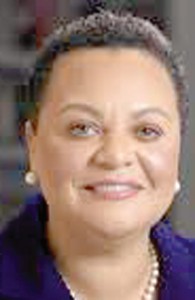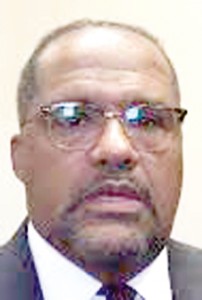How much of an underdog is Karen Carter Peterson really?
29th March 2021 · 0 Comments
By Christopher Tidmore
Contributing Writer
As we approach the April 24 runoff for the 2nd Congressional District race while looking back at the results of the primary, one might consider state Sen. Karen Carter Peterson to be the underdog. As that might hold true, the question must be asked, just how much of an underdog is she?
The answer: Not as much as one might think.
Carter Peterson barely edged her way into the 2nd Congressional District runoff beating Baton Rouge activist Gary Chambers Jr. by less than two percent of the vote, or 21,673 votes to 20,163. In contrast, State Sen. Troy Carter claimed a strong first place position on March 20, 2021, with 36 percent of the vote and 34,402 ballots cast in his favor.
Moreover, Carter Peterson had not enjoyed any growth in her poll position in the weeks before the primary, so much so that UNO pollster Dr. Ed Chervenak observed, “If we had one more week, Karen would have been out, absolutely.” Chambers had effectively consolidated the progressive vote. Chervenak noted that the final results for Carter and Carter Peterson virtually matched their vote in a private poll he and Anthony Licciardi conducted in early March, while Chambers’ final result nearly doubled the 11 percent he notched in the survey. “He was surging,” Chervenak noted in an interview with the daily paper.But with whom? That’s the potential problem for Troy Carter. Progressive Caucasians backed Chambers, and KPC has a good chance to pick up this support.
In the heart of Carter Peterson’s senatorial district sits the five precinct polling stations headquartered at St. Katharine Drexel Preparatory school. Heavy gentrification has turned the once majority Black neighborhoods surrounding the former Xavier Prep into a bastion for white liberals. In point of fact, KPC’s senatorial district may not have an African-American majority at all. The last survey put the seat at 46 percent Black and 45 percent Caucasian, and that Secretary of State report is several years old.
On March 20, the only campaigners waving signs in front of St. Katharine Drexel were white liberal activists donning banners for Gary Chambers. They came out in support of his position as the contest’s true progressive standard-bearer. What was interesting, though, was that the activists lived in her district, and generally enjoyed positive viewpoints of Carter Peterson.
As incidental as this example may seem, JMC Analytics Pollster John Couvillon did attribute Chambers’ solid result in New Orleans to strong support in precincts near the Mississippi River where more than 2/3 of the voters are Caucasian.
“For the lack of a better term, there’s almost an emergence of the white ‘woke’ vote in New Orleans and nowhere else in the district,” Couvillon told reporter Tyler Bridges. Put another way, this electorate most likely supported Vermont U.S. Sen. Bernie Sanders during his 2016 and 2020 presidential bids. They live, though, in KCP’s home turf.
Exit polling data seems to suggest that Carter did a better job of consolidating the vote in his Senate district on the West Bank than Carter Peterson did on the East Bank. However, due to her enthusiastic national support from pro-choice groups like Emily’s List to environmental justice organizations like the Sierra Club to voting activists like Stacey Abrams, KCP’s campaign surrogates believe that she can make a better case to local Leftwing voters to back her candidacy in this most Democratic of Louisiana congressional districts.
Carter is making the same appeal. The irony of the recent congressional contest comes from the fact that the three front-running candidates agreed upon almost every ideological issue. All supported a $15 minimum wage, Medicare-For-All, and other shibboleths of the progressive movement. Few issue-based reasons exist for liberals to resist voting for Carter (other than taking a slightly nuanced view of the Green New Deal, though he supports the “framework” of the AOC proposal). Nevertheless, the West Bank state senator’s greatest advantage in the congressional contest presents a liability with some progressive voters.
Like his friend, the former congressional incumbent Cedric Richmond, Carter has positioned himself as a thoughtful progressive who can work across party lines to serve the needs of New Orleans. Richmond was famed for his close friendship with Republican Whip Steve Scalise. Carter has built a similar profile, having been endorsed by several prominent local Republicans including former state House Speaker Jim Tucker and Jefferson Parish President Cynthia Lee-Sheng. On the other hand, the GOP hates KCP; the rank-and-file have not forgiven her for outspoken opinions as La. Democratic Chairperson.
Skepticism runs both ways, in other words. Carter has a chance to consolidate the Republican vote behind his candidacy. The conservative electorate might prove enough to guarantee the West Bank state senator victory, without one Chambers voter – provided he holds his primary support and the GOP electorate turns out to the polls in the April 24 runoff.
The officially endorsed Republican Claston Bernard underperformed expectations, but still won 10 percent of the vote. Partially, this may have been due to an unfamiliarity with his candidacy, as four percent of the electorate voted for Chelsea Ardoin, a Republican who’s only campaign strategy was that she alphabetically topped the candidate list on the ballot. Not knowing for whom to vote, many Republicans voted for the first candidate who they beheld in the voting booth. Overall, though, the four Republican candidates in the primary combined collected 15,558 votes, or 16.4 percent, of the overall vote. John Couvillon maintains anywhere from 10,000 to 15,600 Republicans will vote in the runoff, based on past voting patterns. That’s enough to carry Carter past the 50 percent threshold.
That is if Republicans do go to the polls. Notably, the GOP candidates earned 20 percent against Cedric Richmond in the November election, when the 2nd District congressman’s reelection more resembled a coronation. There was no contest of which to speak. However, Donald Trump was on the ballot. That will not be true on April 24, and Republican underperformance may not be helped by Claston Bernard’s current refusal to endorse either of the runoff contenders. The former LSU Olympic Decathlete explained to The Louisiana Weekly that he currently does not expect to endorse either candidate noting, “Nothing in their ideology supports my core principles.”
It is important to remember that the 2nd District snakes up the Mississippi River extending all the way to the State Capitol. As a result, Carter has also begun to focus much of his runoff GOTV operation on East Baton Rouge Parish, where – in the primary – he finished third among the 8,679 voters, which was nine percent of the overall vote. Carter Peterson has so far had the advantage here. She ran first in EBR on March 20 followed by Chambers. Carter, however, has not been complacent. Last week, Carter earned the endorsements of Baton Rouge Metro Council President LaMont Cole and Mayor-President Sharon Weston Broome.
Carter Peterson responded by challenging Carter to a series of television debates over the next few weeks to sway the remaining undecided.
Early voting for the April 24 election is scheduled for Saturday, April 10 through Saturday, April 17 (excluding Sunday, April 11), from 8:30 a.m. to 6 p.m. For more information about the Secretary of State’s Elections Division, visit www.GeauxVote.com or call (225) 922-0900. The online deadline to register to vote is Saturday, April 3. Citizens may check their registration or register to vote online at that website.
This article originally published in the March 29, 2021 print edition of The Louisiana Weekly newspaper.





